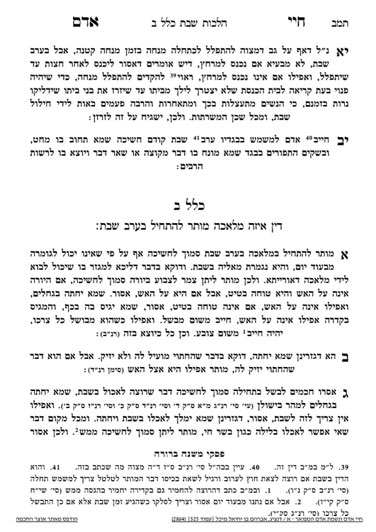We are continuing in siman 3, where the Chayei Adam is discussing the concerns associated with putting food up before Shabbos in order for it to continue cooking into Shabbos itself.
One of the concerns we discussed (S0037) is that if food is still cooking on Shabbos, a person will stir the coals. The Gemara’s example is based on a wood-burning stove. The question we need to discuss is our modern stoves, where we no longer use coals but rather gas or electric. Both Rav Menashe Klein and Rav Moshe Feinstein discuss this question, and write that arguably, one does not need to be concerned. Chazal were not concerned that a person might go and bring more wood to add to the fire in order to increase the flame, because it is not a part of the normal action of increasing a flame. Chazal understood that by the time a person goes to get wood, they will have reminded themselves that today is Shabbos. Chazal’s only concern were the coals currently under the fire, because they could be stirred easily and without too much thought. If so, they both argue that there should be no issur in a gas or electric flame, since it is the equivalent of increasing fuel from outside rather than manipulating the heat currently present. However, they both conclude that, one should be machmir that adding more fuel should actually be considered the equivalent to stirring the coals already present, rather than adding fuel from an outside source. Therefore, they conclude that shehiya will still apply nowadays.
As we have learned, Chazal’s concern is that a person will stir the coals in order to ensure the food is ready in time for the Shabbos seudah. Therefore, the Chayei Adam writes that if the food will not be ready for the Friday night seudah no matter how much the coals are stirred, there is no concern of shehiya, because there will be no reason for a person to stir the coals to speed up the cooking. On the other hand, regarding the Shabbos day seudah, the food will be cooked by then regardless of what is done to it. Thus, since there is no reason to intervene and stir the pot for either seudah, it is muttar to put up the food before Shabbos mamish in order to cook on Shabbos.
The Chayei Adam adds the word mamish, and we need to discuss the implications of it. This leniency is only based on the fact that the food will not be ready in time for the Friday night seudah. If the food has cooked enough that it is even just partially ready, this argument no longer applies, because there is again reason to stir the coals to make it incrementally more edible for the seudah. Therefore, it is only muttar if it is put up close enough to Shabbos that there is no concern the food will be edible enough that one would gain from stirring it.
Summary
- The concern for shehiya still applies to gas and electric stovetops.
- Since the primary concern regarding shehiya is that a person will come to stir the coals, if it is impossible for the food to be ready, regardless of how much it is stirred, it is muttar to place the item on the fire immediately before Shabbos.
- However, one must be sure that the food will not become partially cooked such that one may be tempted to stir the coals in order to improve the item slightly to eat it.
Pesach 5783
Click here to watch Rabbi Reingold performing a Model Seder.



